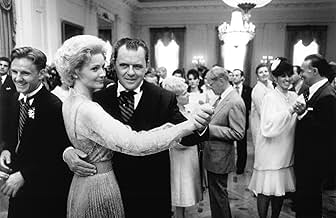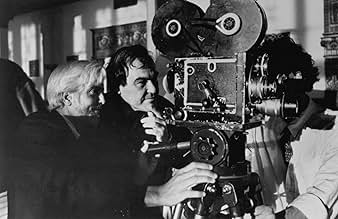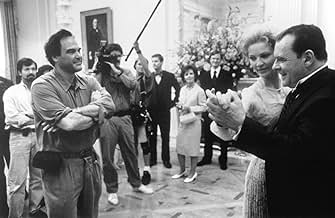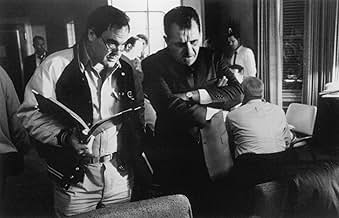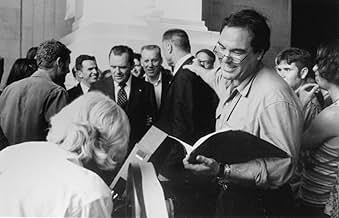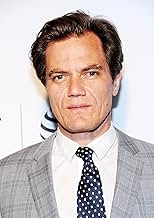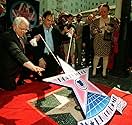A vida e trajectória política de Richard Nixon, desde a sua infância até à eleição para Presidente dos Estados Unidos da América, para dois mandatos e uma amarga queda em desgraça, após o es... Ler tudoA vida e trajectória política de Richard Nixon, desde a sua infância até à eleição para Presidente dos Estados Unidos da América, para dois mandatos e uma amarga queda em desgraça, após o escândalo Watergate e a sua renúncia ao cargo.A vida e trajectória política de Richard Nixon, desde a sua infância até à eleição para Presidente dos Estados Unidos da América, para dois mandatos e uma amarga queda em desgraça, após o escândalo Watergate e a sua renúncia ao cargo.
- Direção
- Roteiristas
- Artistas
- Indicado a 4 Oscars
- 11 vitórias e 18 indicações no total
- Direção
- Roteiristas
- Elenco e equipe completos
- Produção, bilheteria e muito mais no IMDbPro
Avaliações em destaque
Another reason to see this film is the brilliant, absolutely overwhelming lead performance by Anthony Hopkins; his Nixon may not look or sound exactly like the 37th president (but come on, except maybe for Ed Sullivan, who does?) but he embodies his qualities - strengths as well as weaknesses - to such an enormous degree that he simply BECOMES Nixon, at least for the three hours the movie is on screen.
I have to say, though, I was not nearly as impressed as every one else (critics and general audiences alike) seems to be about Joan Allen as Pat Nixon. It's nothing against her performance, she did fine, it's just that as written, the part is rather weak. In fact, I was much more bothered about the liberties the filmmakers took in fleshing out her character than in all the political events; it's like, whenever they wanted to have someone blast Nixon or act as his conscience, they'd trot out Ol' Pat, giving her some of the most embarrasingly "speechified" moments in all of the movies - almost none of their scenes together ringed true as husband as wife; it was more like Nixon sitting across from the Filmmakers' Conscience. In fact, she's angry at him so often in the film you have to wonder, what exactly does she love about the man? The film never answers (or attempts to answer) this question.
But this one minor quibble is not enough to make me downgrade this film. It is an absolutely stunning achievement by any stretch of the imagination, and it contains some interesting thematic and technical echoes of both Citizen Kane (cavernous high ceiling scenes, a "March of Time"-type newsreel on Nixon, a dinner scene between Dick and Pat at a long, impersonal table) as well as The Godfather (the burnished, half-dark half-light cinematography, several "chamber of power" scenes in tight, dark and claustrophobic rooms)that I found, in context, to be totally appropriate. It paints both Nixon and the times he (and the country) lived through on a grand and mythic scale that was truly awesome and, once again, entirely appropriate. Yes, it's a film that is at times big, loud and bombastic (because so, after all, was Nixon himself) but, just as often quiet, contemplative and told at an achingly *human* level. The contrast between these two states is what gives the film a good deal of its overall power and, as I've said, I never would have believed that Stone would have been capable of doing the smaller, quieter scenes so well.
This is a good film to have on tape or DVD, for two reasons. It's so long, and so dense with facts, characters and events, that you're not likely to want to watch it all the way straight through (the first time I saw it was in the theater and though I was held spellbound, I began wishing for an intermission at about the two-hour mark, not so much to stretch my legs but to give my brain a chance to process all I'd seen and heard so far). Also, and more importantly, the videotape includes after the credits two scenes cut out of the final film for time purposes. In both cases, I believe, a severe mistake was made - these are both, I believe, ESSENTIAL sequences; not just nice to have as an additional bargain, but scenes which Stone should have fought tooth and nail to keep in (even cutting out some others if he had to - my vote would have been to excise a few of those Pat Nixon scenes instead). Once scene involves Nixon's visit to the CIA and another a discussion between Nixon and J. Edgar Hoover in the Oval Office. The first scene is a masterpiece of writing and acting (with Sam Waterston as CIA Director Richard Helms, otherwise in no other scene of the movie) and the other is, I think, key in understanding Nixon's motivation to begin taping his White House conversations in the first place (also - an issue which is touched on no other place in the movie). I feel that these two scenes should be edited back into their appropriate places in the movie; seeing them separated from the rest of the film is better than not seeing them at all, but they really belong as part of the entire story.
The acting was quite good. Anthony Hopkins though totally uplifted this movie. I could imagine many people saying his performance was over-the-top or a bit too surreal at times. Yet that is what really made his performance so amazing. The way he was able to transform the many crazy and totally off the wall aspects of Nixon and make them into a reality. To me as the movie went on I felt I was in some way able to see his paranoia, anxiety, thirst for power and just the simple fact of wanting to be liked. I could see he was more of a troubled and vulnerable man than a monster. He never quite connected with anybody which made him bitter and fueled his paranoia and greed even more. To me Hopkins portrayed this all perfectly, all the complexities and inner feelings of Nixon. Hopkins slipped into this role in way that you rarely see. He became Nixon, and at times I was speechless or should I say thoughtless watching him portray such an important figure in such a way. More and more I felt sorry for Nixon, as he looked more and more like a schizophrenic. To me this role was more psychologically bone-chilling than his role as Hannibal Lechter in Silence of the Lambs and I have no problem debating that.
The rest of the cast was quite good as well. Joan Allen was very good in showing the complex relationship/marriage she had with Richard Nixon. James Woods freaked me out at times displaying that pure evil and hatred at times that Hopkins showed as Nixon. Paul Sorvino was very good as Henry Kissinger. Mary Steenburgen was interesting to watch in the very limited time she played in here. The two actors though other than Hopkins though that really stood out to me were Bob Hoskins and Sam Waterston. Despite Hoskins not giving an amazing performance and having very limited time he gave me chills just seeing J. Edgar Hoover being portrayed in some sort of way. Sam Waterston despite being limited to really just one scene was even more chilling than the rest of the cast(excluding Hopkins) combined in that one moment. That moment was one of the most intense face to face scenes that I have ever seen. It was so memorable.
The directing was very good. It was not the best I have seen from Oliver Stone but it was up there. For the first 45 minutes or so I was a bit confused about what was happening and the flow of the movie but I got used to it. The first portion of the movie did feel unbalanced at times but the feel of the movie got better as it wore on. Going back to that one scene between Sam Waterston and Anthony Hopkins, I felt this scene was one of the best directed and written scenes I have seen from Oliver Stone or anyone ever. That scene was a microcosm of the movie. The motion-sickness, mind scrambling, paranoid feeling of that scene captured the entire movie. The feeling of even seeing the president himself being treated like a puppet, despite not that shocking, was mind numbing to watch. That scene was true testament to the writing and directing abilities of Oliver Stone.
The writing was also very good throughout. It seemed as if everything Stone wanted to get across got across. The writing was not amazing but it certainly served it duty. The cinematography was great though. Stone always knows how to get his point across in the way he photographs a movie even if all of other aspects of the movie fail. That dark Oliver Stonish feeling kept on creeping in on every scene, but also that dark psychological feeling that he had put in Born On the Fourth of July and Platoon also was felt through the cinematography. The music by John Williams, who always knows how to capture a moment musically, was simply perfect in here again.
I can understand this movie being boring to a lot of people or it being considered propaganda. Yet I think this movie is an overlooked masterpiece. Just seeing Anthony Hopkins perform as Nixon is a good enough reason to see this movie. He took control of this movie by force and took it to another level. Despite this being an Oliver Stone movie it is more fair than you would think. Of course this movie may have a few conspiracy theories included in it but Oliver Stone never forces his theories on people. There is a reason why at the beginning at every movie he puts a disclaimer saying that not everything in his movies are facts. Despite it being great I don't know if this is a movie for everyone. This movie seems to be crazy and surreal but isn't that how life seems to be at times as well?
Oliver Stone's direction is nothing short of a miracle. As in his 1991 masterpiece, JFK, he has a lot of different characters to bring to life on the screen. He helps his actors fashion their performances with miraculous accuracy. Paul Sorvino is dead-on as Henry Kissinger, as is Joan Allen as Pat Nixon, and Bob Hoskins as the mysterious, mean-spirited J. Edgar Hoover.
The writing is also represents a triumph. Stone and co. are able to synthesize entire pages of historical prose into digestible chunks of dialogue. Aspiring screenwriters should seriously take note.
Although 1995 also saw the likes of Casino, Seven, Heat, and The Usual Suspects, Nixon is the ultimate champion. History on screen has rarely been this exhilarating.
And in this, Oliver Stone is perfectly right. As it stands, the film is very long, and dense with detail. There is no room for the minutiae of the cover-up, which in any event would make for a confusing narrative. Stone's subject is Nixon the man, not the edifice that toppled around him.
And what a man. Richard Milhous Nixon is a truly fascinating personality - both statesman and charlatan: ruthless and vulnerable: unable to express his emotions, yet the most emotional of politicians: a man who spent his life in the law and in high office, but who never absorbed the legal and ethical mores of public life. Genius and crook, bold visionary and spiteful backstabber, Nixon will continue to spellbind biographers for decades to come.
"That's when it starts," says Stone's Nixon, "when you're a kid." The film takes us to Whittier, California in 1925 to see the unloved boy who struggled painfully to earn his parents' approval, without ever quite succeeding. As a teenager, he levered his way into the school football squad by sheer willpower. Lacking talent, he doggedly subjected himself to repeated physical battering in the scrimmages, "a tackle dummy with guts". This syndrome recurs throughout his career. Always susceptible to scathing criticism, never quite commanding respect, Nixon never the less kept ploughing back into the melee when wiser, lesser men would have quit. It is hardly surprising that the years of punishment should have left psychological scars.
Nixon's hatred of John Kennedy had more than one source. He was devastated by the defeat in the 1960 presidential election, but not simply because of disappointment at losing, or even because the Kennedy victory carried the odour of fraud: bitterest of all for Nixon was the realisation that the Kennedy people had played hardball more effectively than the Republicans. Nixon had been out-sharked, and it hurt. On a more profound level still, John Kennedy was everything that Nixon could never be. He was a smooth, handsome prince among men, exuding poise and confidence, a patrician imbued with the habit of authority. To Nixon, the perpetual outsider, the quaker geek who looked shoddy and disreputable, Kennedy seemed to have the dice unfairly loaded in his favour. JFK was an East Coast bright boy and war hero, fabulously wealthy and impeccably well-connected. Nixon owned nothing and knew nobody, and was all too obviously 'on the make'. The great witch-hunts, of Hiss in the 1940's and Ellsberg in the 1970's, are manifestations of the chip on Nixon's shoulder, the fathomless bile that he directed at East Coast college boys.
Nixon always imagined that he was hiding his pain from the world, whereas in fact it was on global display. His nervous little laugh at moments of emotional crisis was so false, so gut-wrenchingly inappropriate, that the onlooker could catch a glimpse of the man's tortured soul. Hopkins captures the wretched laugh with devastating effectiveness, both in the scene where Nixon is confronted by a hostile man in the TV studio audience, and when he solemnly promises that none of the president's men will go to jail. In the "Checkers" broadcast and the presidential TV address on Watergate, Nixon tries to assure the camera that he is not a crook, and on both occasions he has the exact opposite effect, confirming to the viewer that that is precisely what he is. Nixon seems incapable of examining his own conscience: there is a hard core which his rational mind cannot penetrate. Maybe that is why Stone has him referring to himself in the third person throughout the film.
'They' were always out to get Nixon, without it ever being made clear just exactly who 'they' might be. The imperative for this deeply paranoid man was always to be braced, ready for the coming tackle, or to organise pre-emptive strikes against 'them'. Obstructing justice and tampering with evidence were, to Nixon, self-defensive steps that did not need to be justified. It was obvious that such things had to be done. The mystery at the heart of Watergate - why a president so steeped in criminal conspiracy should tape-record his own intimate conversations - makes sense when viewed from Nixon's end of the telescope. He had to have the goods on his own men, ready for the day when they turned on him. It goes even further. This emotional cripple could not bare his bleeding soul to anyone, so his tapes became his confessional and his confidante. Stone's film repeatedly shows Nixon in his awkward arms-extended, double V-sign pose. It is not by chance that it looks like a crucifixion.
Você sabia?
- CuriosidadesTo gain the feel of Richard Nixon, Sir Anthony Hopkins watched on tape almost every speech Nixon ever made several times. He also met some people who knew Nixon who could lend Hopkins some insight on him.
- Erros de gravaçãoThe film shows Nixon signing his resignation letter the day before he leaves office and prior to it being publicly announced. Historically, Nixon informed the nation in an address the night before leaving office, and then signed the letter the next day, which was his last morning in the White House.
- Citações
Richard M. Nixon: [to a portrait of Kennedy] When they look at you, they see what they want to be. When they look at me, they see what they are.
- Cenas durante ou pós-créditosSecond opening credits: "For what is a man profited, if he shall gain the whole world, and lose his own soul?" Matthew 16:26.
- Versões alternativasLetterbox video version features additional outtake footage, including a scene starring Sam Waterston as CIA director Richard Helms.
- Trilhas sonorasMenuetto
from Schubert's "Symphony No. 2 in B Flat Major, D 125"
Written by Franz Schubert
Performed by Koninklijk Concertgebouworkest (as Royal Concertgebouw Orchestra)
Nikolaus Harnoncourt, Conductor
Courtesy of Teldec Classics International GmbH
By arrangement with Warner Special Products
Principais escolhas
- How long is Nixon?Fornecido pela Alexa
Detalhes
Bilheteria
- Orçamento
- US$ 44.000.000 (estimativa)
- Faturamento bruto nos EUA e Canadá
- US$ 13.681.765
- Fim de semana de estreia nos EUA e Canadá
- US$ 2.206.506
- 25 de dez. de 1995
- Faturamento bruto mundial
- US$ 13.681.765
- Tempo de duração3 horas 12 minutos
- Cor
- Mixagem de som
- Proporção
- 2.39 : 1
Contribua para esta página



